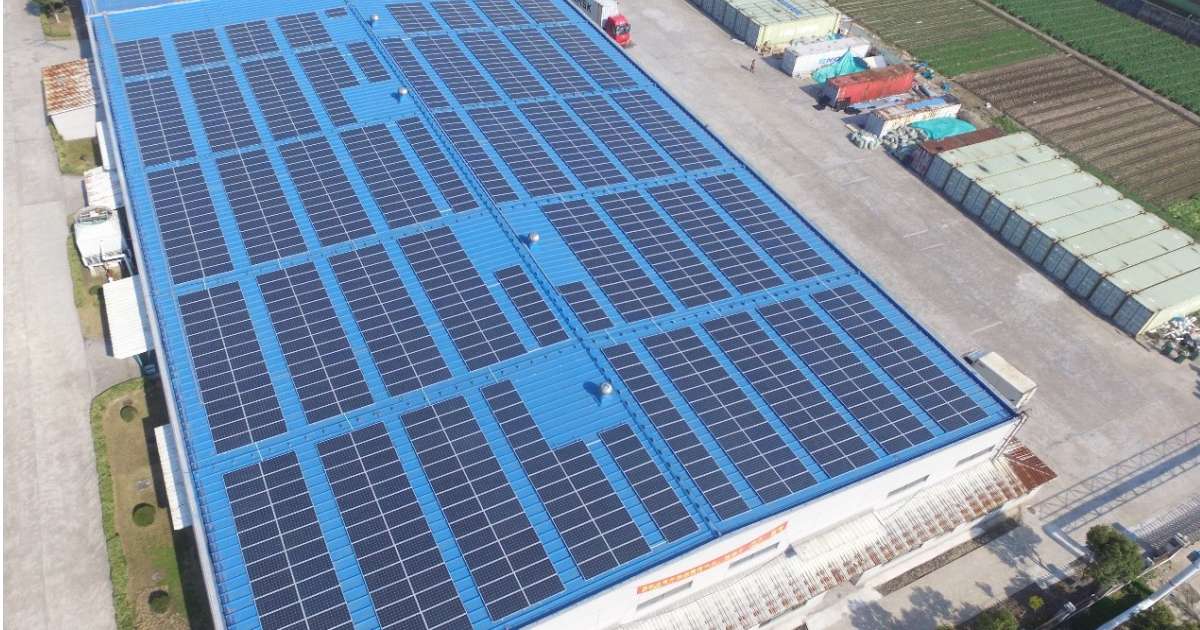
Solar panel manufacturer Sunman Energy is spruiking the typhoon survival street cred of its eArc stick-on solar panels.
Typhoon In-fa made landfall in China at Zhoushan, south of Shanghai in late July. The system dumped record amounts of rainfall on China and it was also a rather breezy event, with wind speeds up to 137kph1.
The event served as a test for an eArc solar panel installation on a Shanghai factory roof where the modules were installed 4 years ago. Sunman Energy says the “panels did not get detached or blown off”.
“In fact, this on-grid project has withstood many typhoons and snowfall over the last 4 years, a testament to the reliability of quick-bonding as an installation method.”
The “quick bonding” process involves the use of butyl tape or silicone glue – there is no mechanical fixing required2. Butyl is a form synthetic rubber created using isobutylene and isoprene.
Here’s an installation of 176 x 295w eArc panels performed in Sydney that Sunman Energy says was completed by 4 workers in 11 hours – including roof preparation time (suggestion: mute your speakers).
eArc solar panels are based on monocrystalline PERC cells and available in framed and non-framed versions.
The F series is frameless and manufactured in capacities of up to 375 watts. Weighing just 5.8kg compared to the ~20kg of a conventional panel, the 370W F-Series eArc has dimensions of 2002×1000×2 mm and has a conversion efficiency of 18.7%. However, in Australia it appears the highest wattage frameless eArc approved for use here currently is the 310W module.
As for pricing, I saw a 310W module advertised for $495 – so they appear to be costly compared to conventional solar panels.
The eArc is primarily designed for the commercial rooftop solar market – particularly buildings with “slender roofs”. These are rooftops constructed to minimum standards that cannot bear the weight of a conventional solar panel array. eArc panels have also been installed on curved roofs here in Australia, including the library in Noosaville and on Byron Bay’s solar train.
Newish Solar Player, Old Hand At The Helm
Sunman Energy is a relatively new panel manufacturer with an interesting pedigree that has an Australian connection.
The company’s founder and chief technology officer is Dr. Zhengrong Shi, who also founded Suntech back in 2001 and was its chairman and chief executive officer until 2013.
Dr. Shi receieved his PhD degree in electrical engineering from the University of New South Wales in Australia back in 1992. He has been a fellow of the Australian Academy of Technological Sciences and Engineering (AATSE) since 2009 and in 2012 he became an Adjunct Professor at the University of NSW.
eArc isn’t the only stick-on solar panel show in town and more will be joining the ranks. Back in May, SunPower spinoff Maxeon Solar Technologies offered a sneak peek at Maxeon Air.
Some initial specs for the Maxeon Air indicate it will be 4mm thick, have a 20.9% conversion efficiency and an installed weight of around 6 kg/m (Sunman’s eArc = 2.8 kg/m2).
Footnotes
- According to Wikipedia, A typhoon has wind speeds of 118–149 km/h , a severe typhoon at least 150 km/h, and a super typhoon 190 km/h. ↩
- While this may be fine for a building rooftop, adhesive-only on a vehicle roof can be problematic and dangerous. ↩

 RSS - Posts
RSS - Posts



An interesting article. I have been looking at ‘stick on’ panels for installation on the roof of a van I am thinking of purchasing.
This is for a 12volt system not 240volts.
Looking at a number of comments on various Van related web sites however there seems to be a major problem with these panels failing due to heat build up coming from no air circulation beneath the panels.
I have no idea what brand of stick on panels these people were using nor the age of the panels but the majority are being removed and replaced with the heavy traditional glass panels.
Can you advise as to eArc or any other stick on brands for that matter that have overcome this heat related failure problem.
Thanks and stay safe in these uncertain time.
Sunman eArc panels have a product warranty of 10 years and a 25 year performance warranty, so they seem confident about the lifespan of their panels. Lightweight Maxeon Air panels will, hopefully, soon be available in Australia and Maxeon has a good reputation for quality:
https://www.solarquotes.com.au/blog/maxeon-air-panels-mb2002/
Try off-road living in Wangara Perth WA. They recommend polycarbonate corflute twinwall and 3M VHB tape for their Allspark 180W Flexible panels.
I am ready to use solar penal
If you use our website we can get you quotes from up to three installers:
https://www.solarquotes.com.au/quote/start/